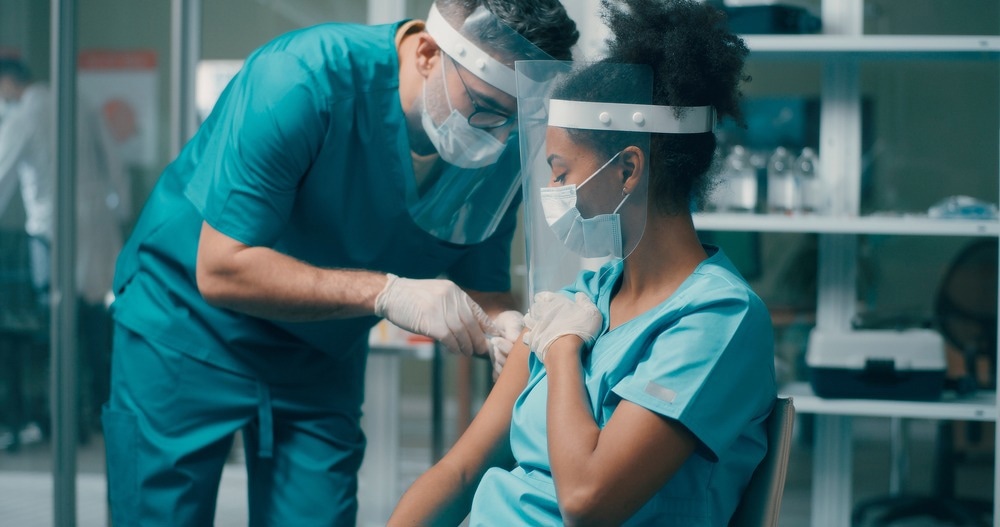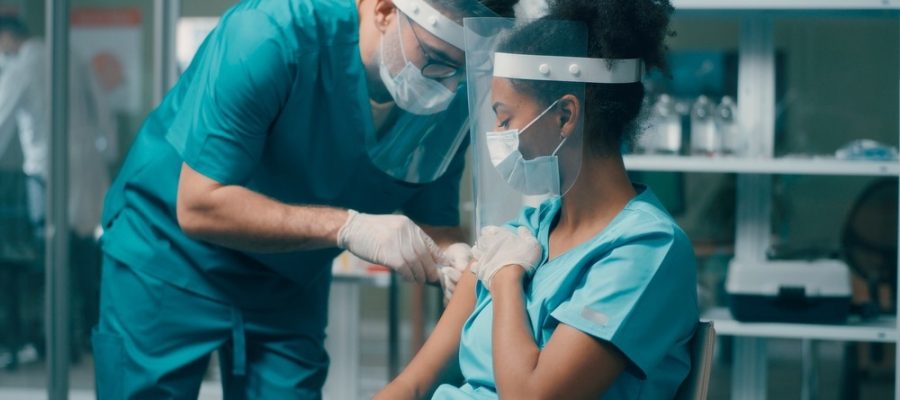A recent study published in The Journal of Infectious Diseases examines the effectiveness of the Pfizer-BioNTech coronavirus disease 2019 (COVID-19) vaccine among long-term care facility (LTCF) staff members.
 Study: Pfizer-BioNTech Coronavirus Disease 2019 Vaccine Effectiveness Against Severe Acute Respiratory Syndrome Coronavirus 2 Infection Among Long-term Care Facility Staff With and Without Prior Infection in New York City, January–June 2021. Image Credit: Frame Stock Footage /Shutterstock
Study: Pfizer-BioNTech Coronavirus Disease 2019 Vaccine Effectiveness Against Severe Acute Respiratory Syndrome Coronavirus 2 Infection Among Long-term Care Facility Staff With and Without Prior Infection in New York City, January–June 2021. Image Credit: Frame Stock Footage /Shutterstock
Background
Epidemiologic data on COVID-19 vaccine effectiveness (VE) is growing among previously infected individuals. Several studies have reported that vaccination after infection improves protection to a greater extent than infection alone, with complete vaccination associated with more than a two-fold reduction in the likelihood of reinfection.
Nevertheless, these studies often relied on surveillance data from individuals non-systematically tested for severe acute respiratory syndrome coronavirus 2 (SARS-CoV-2) infection; therefore, the results may have been biased.
About the study
The present study evaluated COVID-19 VE against incident SARS-CoV-2 infection among LTCF employees in New York City (NYC). Eligible subjects were LTCF staff aged 65 or older who underwent a SARS-CoV-2 polymerase chain reaction (PCR) test at least every 10 days between January 21, 2021, to June 5, 2021.
Labs were required to report test results to the New York State’s Electronic Clinical Laboratory Reporting System (ECLRS). COVID-19 vaccination was provided to all LTCF staff and residents, with vaccination clinics initiated on December 21, 2020. All LTCFs hosted at least one clinic by February 2021.
NYC vaccine providers were required to report vaccinations to the Citywide Immunization Registry (CIR). Test records from ECLRS were probabilistically matched to CIR records. Records with a probability lower than 70 were non-matches (non-vaccinated), whereas those above 90% were matches (vaccinated).
Individuals with a match probability above 70% and below 90% were excluded. Moreover, individuals vaccinated with Janssen or Moderna COVID-19 vaccines, those with a shorter interval of fewer than 17 days between two doses, as well as those who received COVID-19 vaccines from more than one manufacturer, were excluded.
The primary analysis was the comparison of time to infection between non-vaccinated infection-naïve individuals, who were denoted as the reference cohort, and individuals who were non-vaccinated but infected, fully vaccinated but uninfected, and fully vaccinated after infection.
Omics eBook

In the secondary analysis, a counting procedure was used to allow the vaccination status to change from non-vaccinated to vaccinated after the first and second doses. VE of the two-dose regimen against asymptomatic and symptomatic infection was evaluated among infection-naïve individuals.
Study findings
At the time of the study, 7,763 individuals were employed at 179 LTCFs in NYC. About 63% of the LTCF employees were between 45 and 64 years of age, with 74% of the cohort being female. Around 41% of individuals were non-Hispanic Black, 20% non-Hispanic White, 15% Hispanic, 9% Asian or Pacific Islander, and 15% multiracial or from other ethnic groups.
In the primary and secondary analyses, the proportion of vaccinated individuals increased in the initial weeks after vaccines were available and reached 53% by January 31, 2021. In the primary analysis, 57.5% of LTCF staff were fully vaccinated by the end of the study. About 70% of the study participants had been infected before vaccination, with 85% of infections documented in the first COVID-19 wave.
A total of 286 incident SARS-CoV-2 infections were identified in the primary analysis during a median follow-up of 99 days, which led to an incidence rate of 0.44 per 1,000 person-days. This was the highest among non-vaccinated infection-naïve people and lowest in fully vaccinated individuals, regardless of prior infection.
In the secondary analysis, the incidence rate in non-vaccinated subjects without previous infection was 1.7 for 1,000 person-days, 0.63 for every 1,000 person-days in infection-naïve single-dose recipients, and 0.45 in previously infected single-dose recipients. The incidence rate during this analysis was the lowest in fully vaccinated individuals, irrespective of previous infection.
The first vaccine dose reduced infection risk by 73.8% in infection-naïve subjects and 79.6% in those previously infected, relative to infection-naïve non-vaccinated individuals. The VE of the two-dose regimen against symptomatic COVID-19 was 87.5% and 65.2% against asymptomatic illness.
Conclusions
Complete vaccination following infection increased protection against future infection relative to immunity conferred by infection alone among NYC LTCF staff. These findings corroborate growing evidence that two COVID-19 vaccine doses increase protection in previously infected subjects. Moreover, the reinfection risk was 2.6-fold greater in previously infected individuals who were not vaccinated than those fully vaccinated.
Taken together, the current study indicates that complete vaccination reduced SARS-CoV-2 infection risk by 80% and augmented protection conferred by prior infection. These findings emphasize the importance of completing the initial two-dose COVID-19 vaccine regimen, regardless of previous infection.
Importantly, future studies are needed to assess the role of booster doses and additional antigenic targets in the COVID-19 vaccine.
- Peebles, K., Arciuolo, R. J., Romano, A. S., et al. (2023). Pfizer-BioNTech Coronavirus Disease 2019 Vaccine Effectiveness Against Severe Acute Respiratory Syndrome Coronavirus 2 Infection Among Long-term Care Facility Staff With and Without Prior Infection in New York City, January–June 2021. The Journal of Infectious Diseases. doi:10.1093/infdis/jiac448
Posted in: Medical Science News | Medical Research News | Disease/Infection News | Healthcare News | Pharmaceutical News
Tags: Coronavirus, Coronavirus Disease COVID-19, immunity, Immunization, Infectious Diseases, Laboratory, Polymerase, Polymerase Chain Reaction, Respiratory, SARS, SARS-CoV-2, Severe Acute Respiratory, Severe Acute Respiratory Syndrome, Syndrome, Vaccine

Written by
Tarun Sai Lomte
Tarun is a writer based in Hyderabad, India. He has a Master’s degree in Biotechnology from the University of Hyderabad and is enthusiastic about scientific research. He enjoys reading research papers and literature reviews and is passionate about writing.
Source: Read Full Article
